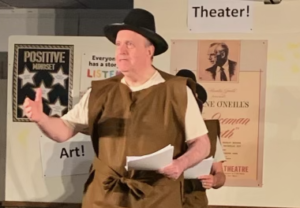
As I watched a scene in a TV movie where a mother is preening her young son in his Indian costume to make sure the head dress and rest of his regalia look just cute as a button, I found myself reacting differently than before to seeing the Americana image of an Indian costume on a young child.
A question popped into my mind: Why do we treat the traditional attire of a specific ethnicity – in this case, native Americans – as a “costume” when we do not, in effect, mimic the clothing of any other ethnicity in the same way?
There was a logical reason for my altered perspective. A couple of hours before seeing that TV scene with the native American “costume,” I had seen a community theater production that unapologetically challenges the stereotypical tropes we attach to Native Americans: it is The Thanksgiving Play, by Larissa Fasthorse, who questions and seeks to reframe the customary American celebration of the holiday and its assumed origins. As one character unironically describes the holiday’s import: “We eat food and watch games.”
The YCP TheaterWorks production of The Thanksgiving Play is in performance on weekends now through June 30, 2024, at the Unitarian Universalist Church in Croton-on-Hudson (N.Y.). Info > ycptw.org.
In his bestselling book Sapiens, Yuval Noah Harari posits that “We tell ourselves stories in order to live.” We tell ourselves stories not just about ourselves but about others, whose histories we tailor to complement the narrative of our own stories.
Whomever authors these histories naturally tell the tales from their points of view. Then, later on, maybe centuries later, certain facts start to emerge that tell a somewhat different, often contradictory history. That causes defenders of the original origin stories, passed down through generations, to cry foul. They contend that the first draft of history is the only draft we need to honor. They believe that any revisions or revelations that don’t conform to the original version only serve to dishonor history and those who lived it.
Ms. Fasthorse bluntly, effectively – and entertainingly – eviscerates the persistent practice of defending cliches that shape American history, even when there are compelling, provable facts that demystify the myths we tell ourselves.
She points out, through specific examples, why our representation of Thanksgiving is mainly artifice, stuffed with questionable authenticity. She makes her eye-opening points with humor, but the laughs elicited can be uncomfortable and self-conscious, as audience members witness their neat notion of Thanksgiving being carved up like a butterball turkey.
Most of that explication falls to the character of Caden, played with impactful stage presence by stalwart local actor Derek Tarson (Nyack). We’re watching a high school drama club prepare its Thanksgiving show and Caden is a teacher who has been brought in as both an actor in the play and as a history specialist to ensure the educational exercise is as truthful and factual as possible. Good luck with that, as we come to find out. (In the pithy words of one character, “Facts kill dreams.”)
Caden is working with drama teacher Logan (Samantha Darling of Croton-on-Hudson) and her partner Jaxton (Dru Darling, Croton-on-Hudson), a street performer. Both are socially uber-conscious and, in Logan’s case, eminently practical about how much revisionist history can be presented within the mandated constructs and pedagogy of public education.
She sticks to the script of what is allowed (and required) by such (made-up) funding sources as the “Race and Gender Equity in History Grant.” Both Darlings bring a lot of energy and earnestness to their principal roles.
Another character through which Ms. Fasthorse scores points about such au courant issues as cultural appropriation and representation is the comically self-absorbed Alicia, played with well-timed dryness by Sonia Garber (Peekskill).
Typical of how party-pooper Caden tries to set the others straight about what comprised the earliest Thanksgivings is his story of why the “sides” on the dinner table were likely to be not yams and squash but tropical fruits.
As he tells the others, the Spanish who landed in St. Augustine in 1565 (the first permanent European settlement in the U.S.), had journeyed there from Puerto Rico, led by Pedro Menendez. Sharing the bounty of their land was an act of good will toward the Native Americans they encountered. Caden also makes a point of calling the Pilgrims Separatists (because, unlike Puritans, they did not wish to remain affiliated with their homeland’s Church of England.)
It’s little wonder Director Richard Troiano (Monroe) found The Thanksgiving Play highly relatable. He recently retired after more than three decades as an English teacher, mostly in Rockland County, and, like fictional Logan, supervised the drama club and their productions.
“I saw the play in 2023 on Broadway when I was looking for a show to direct, and said I have to do this,” he told me. As is true of Logan, “We were really serious about what we did,” but, unlike Logan, “I didn’t have to worry about political correctness.” Although, one time he did run up against the inviolable rules of the schools, when he wanted to put on the Stephen Schwartz musical Godspell. He couldn’t do it because “you can’t mention God in school.”
Also appealing to Mr. Troiano’s theatrical instincts is The Thanksgiving Play’s fertile, if fraught, depiction of four white characters attempting to do justice to a school play meant to teach diversity. What could go wrong?
How does political correctness apply to community theater? Says Mr. Troiano, who counts more than 50 notches in his director’s belt, “We have to think who the audience will be. There are restrictions we have in mind – some language can’t be too explicit – so we won’t go there because it won’t be acceptable.”
Separate from the four principal characters, and integral to the play’s satirizing of cultural (mis)representation, are several so-called “interscenes” that are sandwiched between the play’s narrative scenes and performed by six actors. They portray a teacher and her students, through whom the author frames the folly of school and cultural customs that purport to honor history but can veer off into inadvertently parodying it instead.
The versatile interscene ensemble features Gretchen Craig (Peekskill), Heather Firestone (Cold Spring), Kate Gleeson (Monroe), Lisa Lawrence (Yorktown Heights), Jeffrey Ramsey (White Plains), Gary D. Simon (Cortlandt).
Additional credits for The Thanksgiving Play: Anne Rodgers Pearl, Producer; Tom Campbell, Stage Manager; Janis Levitt, Assistant Stage Manager; Richard Troiano, Lighting Design; Mark Firestone, Sound Design; Floyd Gumble, Set Design. Ann Signorelli, Costumes.






